Abstract
Winett and Winkler aptly criticized the “appropriate” behaviors that behavior modifiers have chosen to change. However, after reviewing 14 Journal of Applied Behavior Analysis articles concerning behavior modification in the classroom, they made the sweeping over-generalization that “as currently practised, behavior modification has done very little to change the deplorable state of our schools.” Finally, they suggest a free classroom in which learning is accompanied by “singing, laughing, and whistling.” A number of studies not mentioned by Winett and Winkler are here presented to illustrate the innovative ways in which behavior modification has been utilized to change the complexion of classrooms from the elementary school to the college level. A strawman model child as purportedly seen by behavior modifiers was built by Winett and Winkler, but this author could not find one instance in the literature where the teacher or behavior modifier desired the behavior thus depicted by the straw-man model child. Furthermore, this author questions the desirability of the “informal” or “free” classroom approach for children with marked social and academic problems. Nonetheless, the general admonition of Winett and Winkler should definitely by taken seriously—namely the behavior modifier should seriously question the behaviors he is being asked to change. Finally, a possible integration of reinforcement principles and some aspects of the informal school are discussed.
Full text
PDF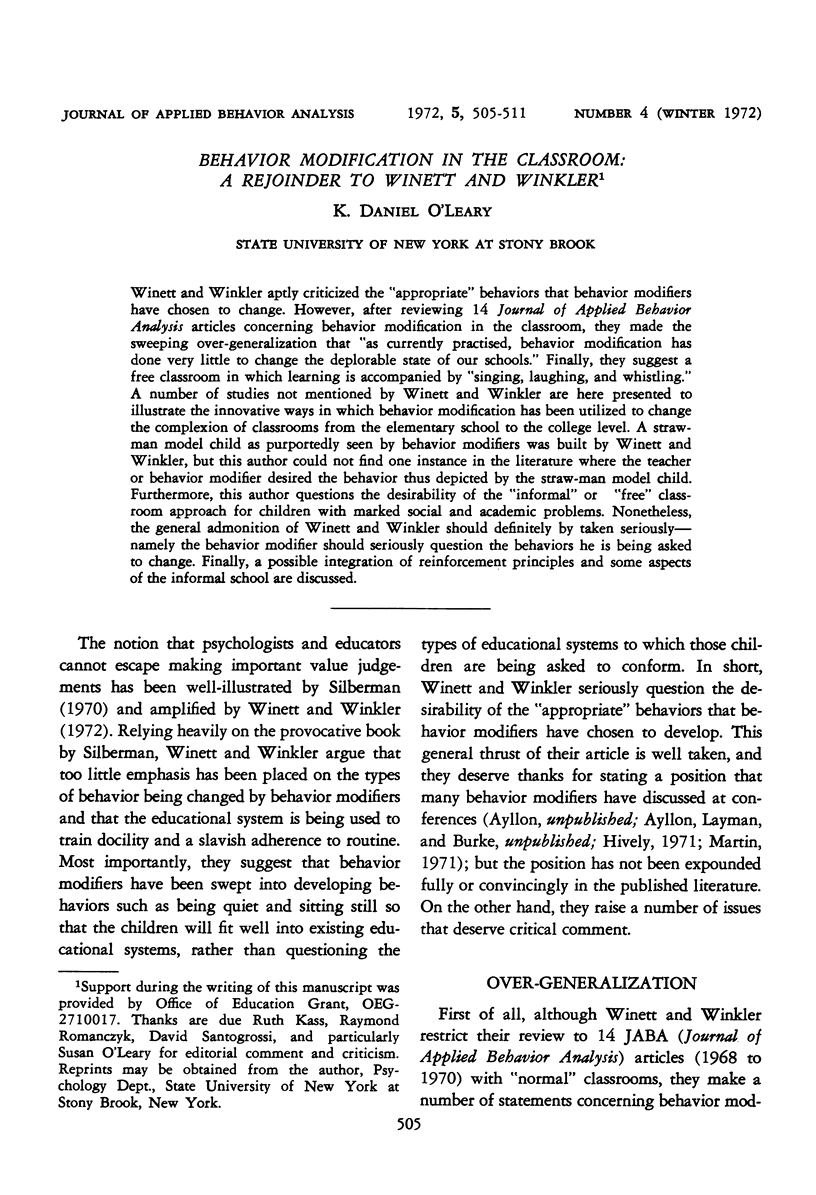
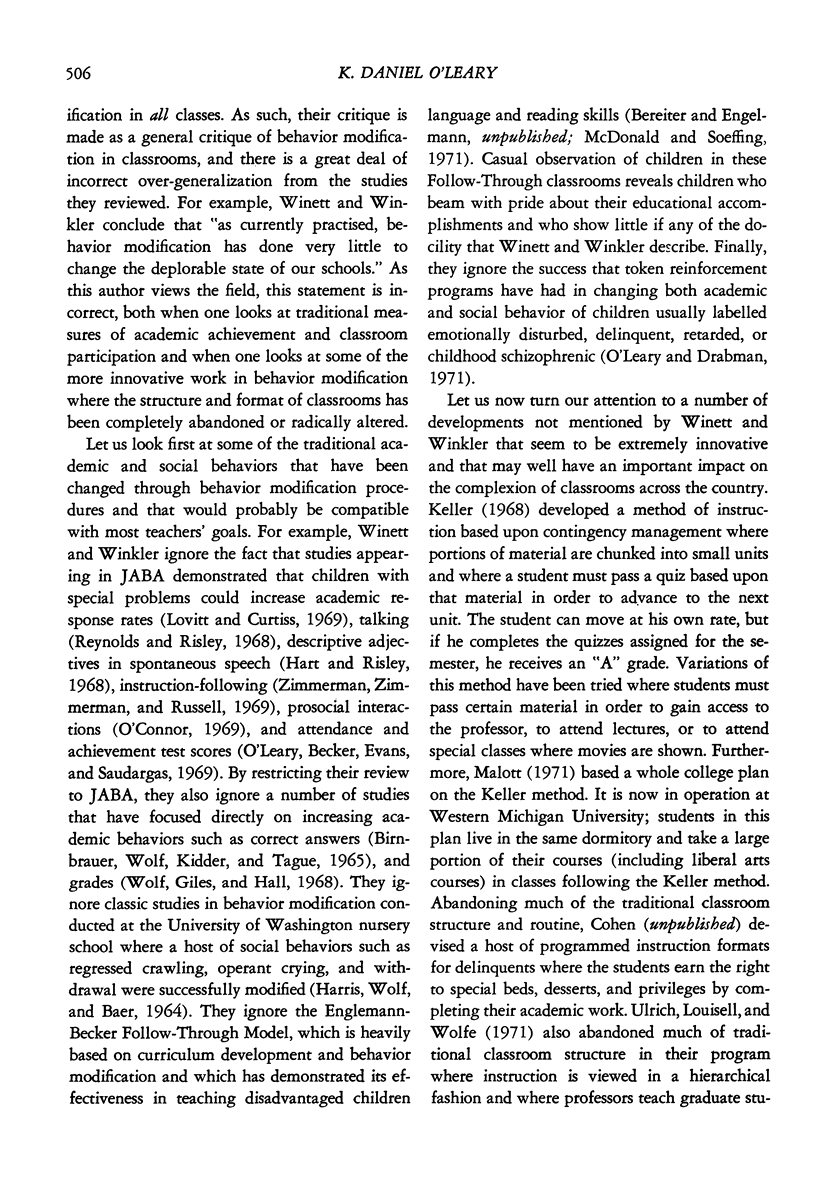
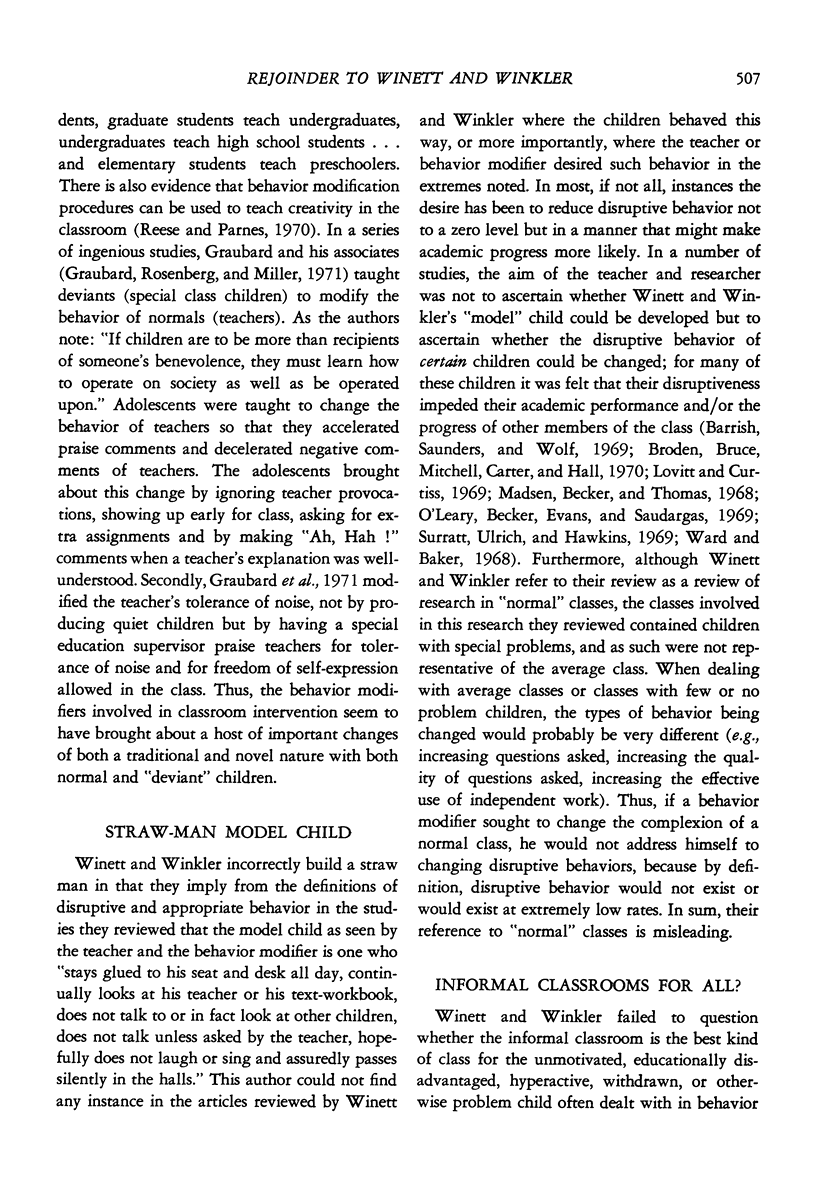
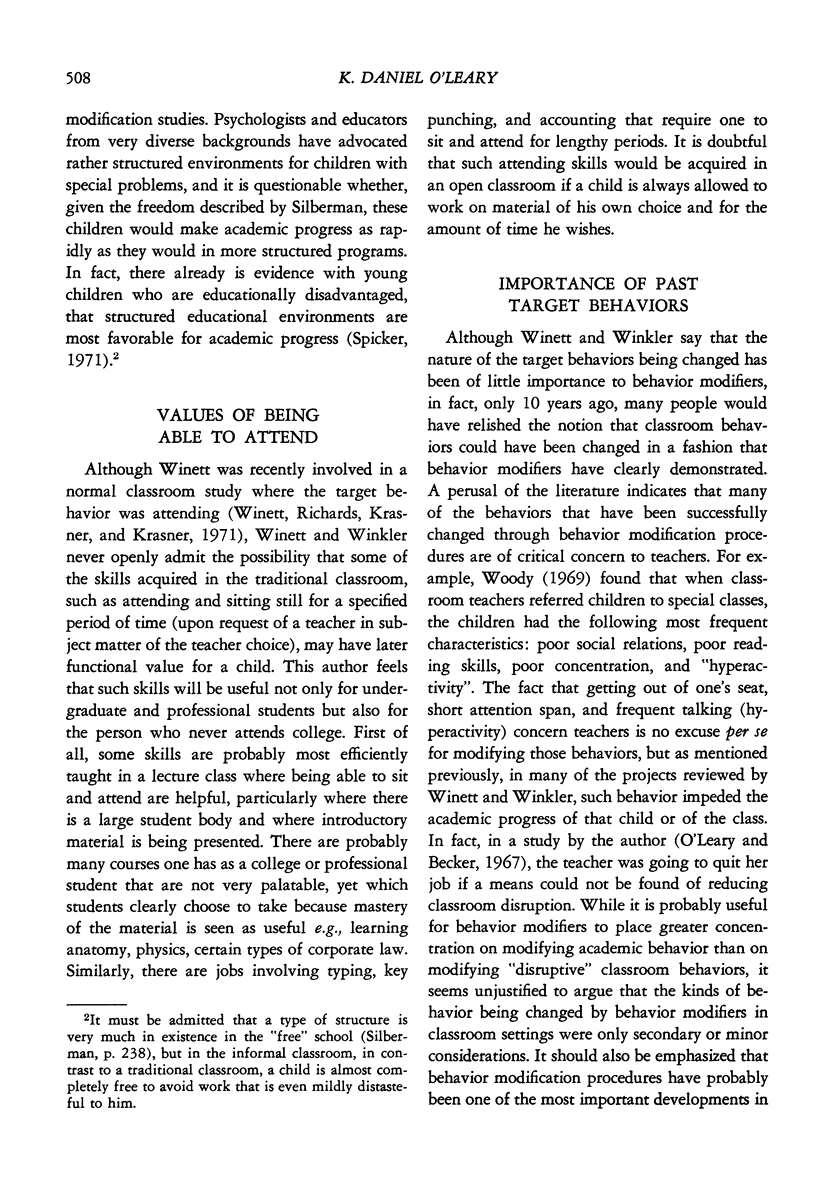
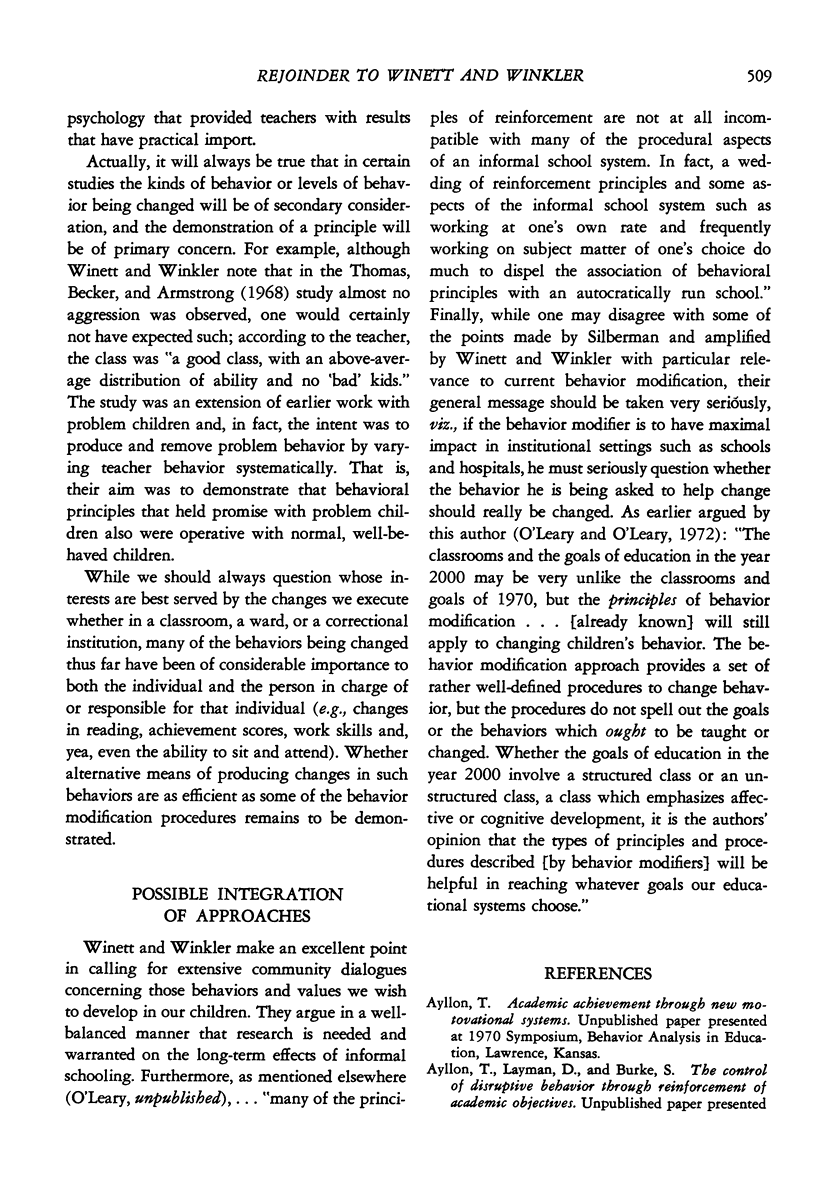
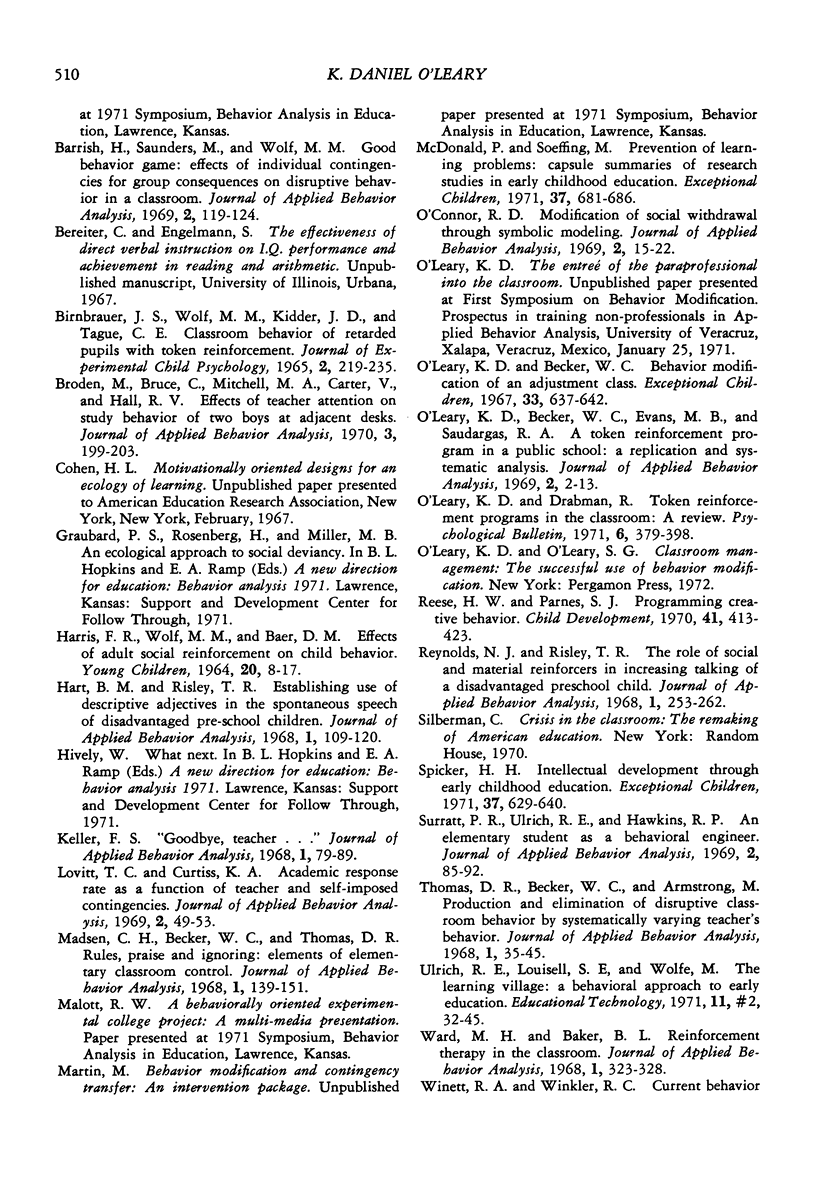
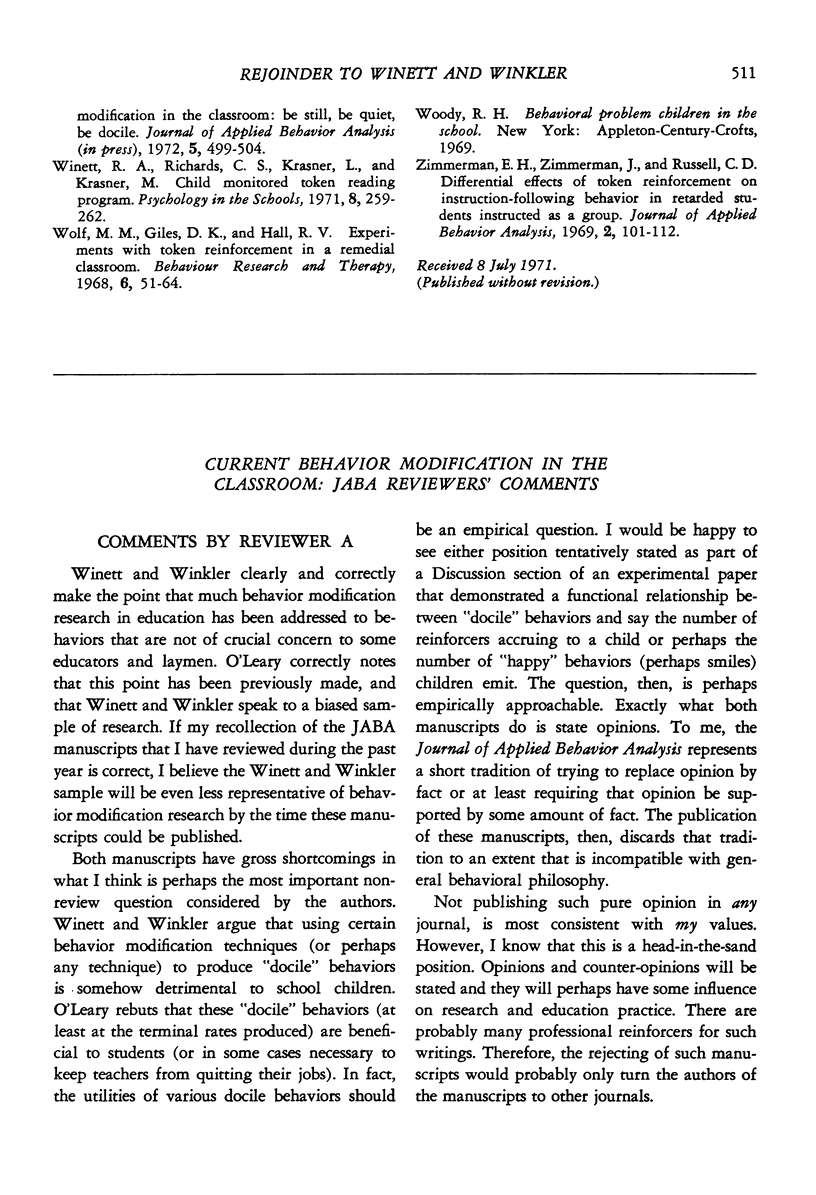
Selected References
These references are in PubMed. This may not be the complete list of references from this article.
- Barrish H. H., Saunders M., Wolf M. M. Good behavior game: effects of individual contingencies for group consequences on disruptive behavior in a classroom. J Appl Behav Anal. 1969 Summer;2(2):119–124. doi: 10.1901/jaba.1969.2-119. [DOI] [PMC free article] [PubMed] [Google Scholar]
- Broden M., Bruce C., Mitchell M. A., Carter V., Hall R. V. Effects of teacher attention on attending behavior of two boys at adjacent desks. J Appl Behav Anal. 1970 Fall;3(3):199–203. doi: 10.1901/jaba.1970.3-199. [DOI] [PMC free article] [PubMed] [Google Scholar]
- Hart B. M., Risley T. R. Establishing use of descriptive adjectives in the spontaneous speech of disadvantaged preschool children. J Appl Behav Anal. 1968 Summer;1(2):109–120. doi: 10.1901/jaba.1968.1-109. [DOI] [PMC free article] [PubMed] [Google Scholar]
- Keller F. S. "Good-bye, teacher...". J Appl Behav Anal. 1968 Spring;1(1):79–89. doi: 10.1901/jaba.1968.1-79. [DOI] [PMC free article] [PubMed] [Google Scholar]
- Lovitt T. C., Curtiss K. A. Academic response rate as a function of teacher- and self-imposed contingencies. J Appl Behav Anal. 1969 Spring;2(1):49–53. doi: 10.1901/jaba.1969.2-49. [DOI] [PMC free article] [PubMed] [Google Scholar]
- Madsen C. H., Becker W. C., Thomas D. R. Rules, praise, and ignoring: elements of elementary classroom control. J Appl Behav Anal. 1968 Summer;1(2):139–150. doi: 10.1901/jaba.1968.1-139. [DOI] [PMC free article] [PubMed] [Google Scholar]
- McDonald P. L., Soeffing M. Prevention of learning problems: capsule summaries of research studies in early childhood education. Except Child. 1971 May;37(9):681–686. doi: 10.1177/001440297103700908. [DOI] [PubMed] [Google Scholar]
- O'Leary K. D., Becker W. C. Behavior modification of an adjustment class: a token reinforcement program. Except Child. 1967 May;33(9):637–642. [PubMed] [Google Scholar]
- O'connor R. D. Modification of social withdrawal through symbolic modeling. J Appl Behav Anal. 1969 Spring;2(1):15–22. doi: 10.1901/jaba.1969.2-15. [DOI] [PMC free article] [PubMed] [Google Scholar]
- O'leary K. D., Becker W. C., Evans M. B., Saudargas R. A. A token reinforcement program in a public school: a replication and systematic analysis. J Appl Behav Anal. 1969 Spring;2(1):3–13. doi: 10.1901/jaba.1969.2-3. [DOI] [PMC free article] [PubMed] [Google Scholar]
- Reynolds N. J., Risley T. R. The role of social and material reinforcers in increasing talking of a disadvantaged preschool child. J Appl Behav Anal. 1968 Fall;1(3):253–262. doi: 10.1901/jaba.1968.1-253. [DOI] [PMC free article] [PubMed] [Google Scholar]
- Surratt P. R., Ulrich R. E., Hawkins R. P. An elementary student as a behavioral engineer. J Appl Behav Anal. 1969 Summer;2(2):85–92. doi: 10.1901/jaba.1969.2-85. [DOI] [PMC free article] [PubMed] [Google Scholar]
- Thomas D. R., Becker W. C., Armstrong M. Production and elimination of disruptive classroom behavior by systematically varying teacher's behavior. J Appl Behav Anal. 1968 Spring;1(1):35–45. doi: 10.1901/jaba.1968.1-35. [DOI] [PMC free article] [PubMed] [Google Scholar]
- Ward M. H., Baker B. L. Reinforcement therapy in the classroom. J Appl Behav Anal. 1968 Winter;1(4):323–328. doi: 10.1901/jaba.1968.1-323. [DOI] [PMC free article] [PubMed] [Google Scholar]
- Wolf M. M., Giles D. K., Hall R. V. Experiments with token reinforcement in a remedial classroom. Behav Res Ther. 1968 Feb;6(1):51–64. doi: 10.1016/0005-7967(68)90042-9. [DOI] [PubMed] [Google Scholar]
- Zimmerman E. H., Zimmerman J., Russell C. D. Differential effects of token reinforcement on instruction-following behavior in retarded students instructed as a group. J Appl Behav Anal. 1969 Summer;2(2):101–112. doi: 10.1901/jaba.1969.2-101. [DOI] [PMC free article] [PubMed] [Google Scholar]


